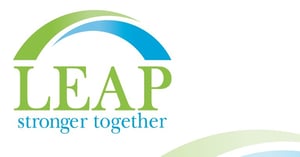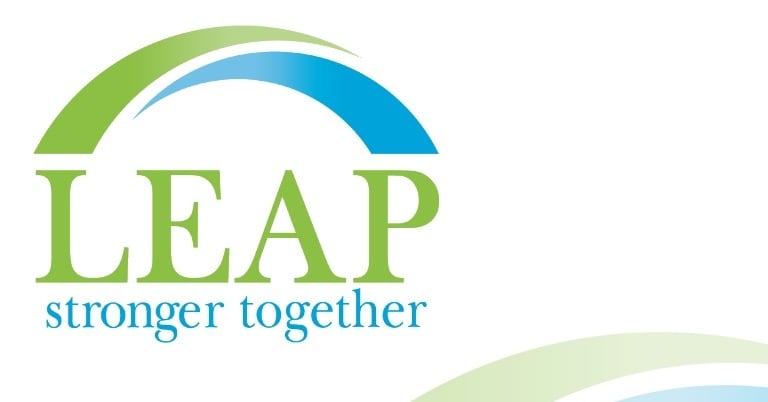
Capital Area Child Care Coalition (CACCC) Resource Hub supports child care provider business operations and employer child care benefits
LANSING, Mich.—(Sept. 25, 2024)—Recognizing that access to high-quality, affordable child care is crucial to growing the Lansing region’s economy, the Lansing Economic Area Partnership (LEAP) today announced the launch of a new online hub that aims to connect, strengthen, and expand the regional child care ecosystem.
 “A strong local economy and high-quality, highly accessible early childhood education are intrinsically linked,” said Bob Trezise, President and CEO of LEAP (left). “When parents have access to quality child care they are more likely to increase their earnings, and businesses benefit because their workers can be more productive. From a regional growth perspective, families need to be assured that high quality care is available to them, and this initiative ensures that the Lansing region will be able to provide that care for generations to come. Today’s launch is the result of many months of partnership and engagement between child care providers, business leaders, parents, local government representatives, economic development professionals, and other stakeholders who care passionately about the future of our region. Their hard work has positioned us well for continued growth and success.”
“A strong local economy and high-quality, highly accessible early childhood education are intrinsically linked,” said Bob Trezise, President and CEO of LEAP (left). “When parents have access to quality child care they are more likely to increase their earnings, and businesses benefit because their workers can be more productive. From a regional growth perspective, families need to be assured that high quality care is available to them, and this initiative ensures that the Lansing region will be able to provide that care for generations to come. Today’s launch is the result of many months of partnership and engagement between child care providers, business leaders, parents, local government representatives, economic development professionals, and other stakeholders who care passionately about the future of our region. Their hard work has positioned us well for continued growth and success.”
The Capital Area Child Care Coalition (CACCC) Resource Hub—launched by LEAP in partnership with Capital Area Michigan Works! and the United Way of South Central Michigan—has two key goals: to support local child care providers and connect them to available business resources; and to assist employers as they strive to make child care more accessible and affordable for their employees, leading to more productive workers and enabling more parents and caregivers to enter or stay in the workforce.
“If we want a thriving workforce, business leaders need to think about access to child care, the cost of child care, and pursuing family-friendly and child care-friendly policies as an economic development issue,” said Emma Bostwick, Director of Business Attraction at LEAP. “The Capital Region will be better equipped to attract new talent and businesses when they can ensure employees have access to child care that fits every family’s needs and budget. The CACCC Resource Hub will drive positive change for our region by increasing the supply of high-quality, licensed child care.”
 The Lansing area faces several child care challenges, as identified in a recent report commissioned by CACCC and conducted by Public Sector Consultants. First, child care is simply not affordable for the majority of residents—on average, families working full time at minimum wage pay 41% of their income to child care. In addition, the Lansing tri-county region suffers from a 56% child care gap, meaning there is a higher need for child care than there are spots available.
The Lansing area faces several child care challenges, as identified in a recent report commissioned by CACCC and conducted by Public Sector Consultants. First, child care is simply not affordable for the majority of residents—on average, families working full time at minimum wage pay 41% of their income to child care. In addition, the Lansing tri-county region suffers from a 56% child care gap, meaning there is a higher need for child care than there are spots available.
“Quality child care not only supports a child’s development and well-being—it’s also imperative for the economic success of our communities,” said Chris Sargent, President and Executive Officer of United Way of South Central Michigan. “We will continue to solicit input from care providers, business leaders, parents and other stakeholders to ensure that the CACCC Resource Hub is helping us meet our goals of supporting our local families while becoming more appealing to prospective residents and job creators.”
In June, the CACCC held an Employer Roundtable that brought together regional employers, human resource professionals, and C-suite leaders to discuss the impact of child care on employees and businesses. Attendees—83% of which said that child care access affects their ability to recruit and retain employees—shared strategies around supporting employees in overcoming childcare barriers, ultimately enhancing workforce engagement across sectors. For example, eligible employers in Ingham County can take part in the MI Tri-Share program, under which the cost of child care is shared equally among employer, employee and the State of Michigan. A follow-up technical assistance workshop for employers is planned for September this year.
 “Child care conversations are critical to supporting workforce development solutions and growth opportunities,” said Carrie Rosingana, Chief Executive Officer for Capital Area Michigan Works! (left). “The Lansing area is lucky to have employers that are passionate about strengthening the child care network in our area and helping their employees access the quality care they need. We look forward to partnering with these leaders to help address child care gaps in our community.”
“Child care conversations are critical to supporting workforce development solutions and growth opportunities,” said Carrie Rosingana, Chief Executive Officer for Capital Area Michigan Works! (left). “The Lansing area is lucky to have employers that are passionate about strengthening the child care network in our area and helping their employees access the quality care they need. We look forward to partnering with these leaders to help address child care gaps in our community.”
Adam Grass of Heritage Hollow, which works with companies to provide on-site daycare or discounted partnerships for child care, said at the Employer Roundtable event that his company ultimately chose to offer benefits to its own employees.
“About 40% of my staff are mothers who exited the workforce who did not re-enter because they could not find something to do with their children,” he said. “Now they've come in, they're back in the workforce, and they're doing great things.” He also shared that supporting employees with child care helps with recruitment and retention, improves workplace culture, and broadens the talent pool.
As a group of over 70 community leaders in Clinton, Eaton and Ingham Counties, the CACCC is dedicated to increasing the supply of high-quality childcare in the region. Their efforts have been recognized through the regional childcare coalition grant awarded by the Early Childhood Investment Corporation’s (ECIC) Child Care Innovation Fund as part of the Caring for MI Future initiative. The coalition since being awarded has conducted research, including cataloging existing providers, surveying providers, and conducting parent focus groups, that help the coalition make data-driven decisions, including a Regional Action Plan underway.
“The Resource Hub is just one aspect of the CACCC’s ongoing efforts to improve child care access,” said Alicia Guevara Warren, Chief Executive Officer of ECIC. “We’re excited to partner with the coalition as it works to reduce barriers, assist providers, promote the talent pipeline and engagement employers to support the child care needs of their employers.”
###
About LEAP
The Lansing Economic Area Partnership (LEAP) is a coalition of area leaders partnering to build a stronger community for all — working every day to grow, retain and attract business to the Lansing, Michigan, region.
About the Child Care Innovation Fund:
ECIC’s Child Care Innovation Fund collaborates with national, state, regional and community partners to design, pilot, and scale common-sense business, workforce, and financing solutions that expand equitable access to high quality, affordable child care for working families.










.jpg)



